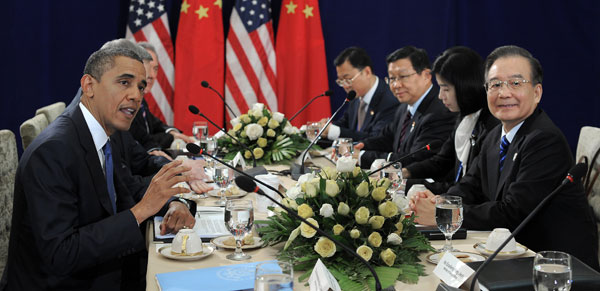US 'will not take sides on disputes'
 0 Comment(s)
0 Comment(s) Print
Print E-mail China Daily, November 21, 2012
E-mail China Daily, November 21, 2012
US President Barack Obama assured Premier Wen Jiabao on Tuesday that Washington will not take sides on issues concerning sovereignty and territorial disputes.
 |
|
US President Barack Obama meets Premier Wen Jiabao at the Peace Palace in the Cambodian capital, Phnom Penh, on Tuesday. [Photo: Agencies via China Daily] |
The two leaders, meeting on the fringes of the East Asia summit in Cambodia, also confirmed Beijing and Washington's commitment to continue enhancing relations. The meeting followed this month's power transfer in the Communist Party of China and the US election.
Meetings involving the leaders of China and the US are the focus of global attention as both countries are increasingly engaged in the region, and Washington follows its Asia-pivot policy.
Chinese experts said the remarks implied the general direction of policies that Beijing and Washington will follow.
Obama said "the US expects to solve regional hotspot issues peacefully. The US will not take sides on issues concerning sovereignty and territorial disputes", according to a press release in Chinese issued by the Foreign Ministry.
The remarks come against the backdrop of several US allies and partners in Asia, including Japan, expecting US support in territorial disputes with China, that escalated this year.
The US is convinced that China's peaceful rise and success is crucial to world security and prosperity, Obama said.
Washington expects existing mechanisms, including the Strategic and Economic Dialogue to continue, Obama said. He also called for the drawing up of a detailed roadmap for US-China ties over the next four years.
Wen said China is at a key stage of development and needs a long-term peaceful and stable environment. "China will continue to be a responsible major country that loves and maintains peace,'' he said.
Wen said he hopes both countries will pursue partnership. "We should solve difficulties and differences through large-scale economic and financial cooperation."
"We will continue to enhance communication and consultation on international and regional issues, especially in the Asia-Pacific region," Wen said.
Obama said that, as the world's two largest economies, China and the US had a "special responsibility" to work together to ensure sustained and balanced growth and to establish "clear rules of the road" on trade and investment.
"It is important that our two countries cooperate to build a more secure and prosperous future for the Asia-Pacific region and for the world," he said.
Niu Jun, an expert on US studies at Peking University, said as both China and the US have completed a crucial period for their respective leaderships, "the remarks of Wen and Obama reflect the main direction of policies for the next term''.
"And apparently the key will be seeking deeper cooperation, especially in the Asia-Pacific region.''
Besides, the remarks showed both countries are clear that the main part of their cooperation will be on economic and trade affairs, Niu said, adding however the two countries have different concerns.
"Washington is asking for the standardized operation of Chinese enterprises, while Beijing is seeking new points of cooperation.''
Jia Xiudong, a senior researcher on international affairs at the China Institute of International Studies, said both countries should abide by economic and trade rules but the rules should not unjustly penalize China or be adopted by the US unilaterally.
The US launched several rounds of anti-dumping and anti-subsidy probes on Chinese goods this year.
After an 11-month investigation, the US House Intelligence Committee issued a report in October that characterizes two leading Chinese telecom equipment firms, Huawei and ZTE, as potential threats to US security because of the committee's belief that the companies are "too closely tied to the Chinese government''. The report failed to present any concrete evidence.
China's largest machinery maker, Sany Group, also vowed last month that it will "fight to the very end" in a lawsuit it filed against Obama after the president blocked a wind farm project citing national security concerns. "In these cases, the so-called US rules are unfair and have been used for protectionism," Jia said.
"Premier Wen mentioned using large-scale economic and financial cooperation to solve difficulties and differences, the wording is quite fresh,'' he said.
China is seeking to reach the target by "making the cake bigger", through various means, including expanding trade and economic cooperation as well as deepening cooperation in the international financial system, such as at the World Bank and International Monetary Fund, Jia said.





